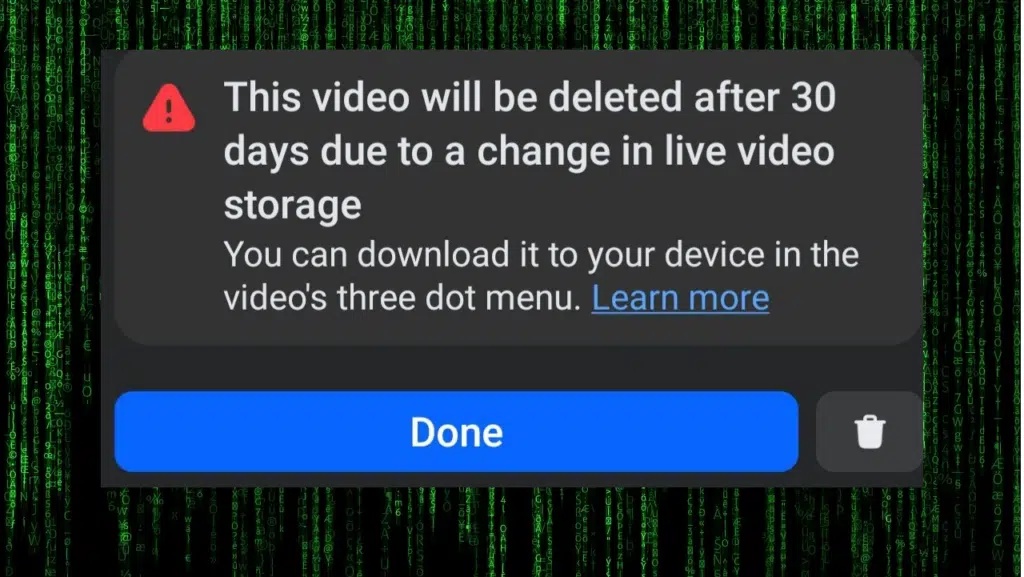
Facebook To Mass-Purge Your ‘Live’ Content (Lessons Re-Learned)
Archived podcasts, church services, political speeches, government meetings, news events, classes, concerts, school ceremonies, security surveillance, and family milestones are about to go up in smoke like so many MySpace memories.
In an announcement many longtime Facebook users found unnerving, the social media giant announced it would soon no longer be storing newly made “Facebook Live” footage indefinitely.
And there was more news: older Live content would not be grandfathered, but purged. At some point in the future, Meta indicated it would contact c̶u̶s̶t̶o̶m̶e̶r̶s̶ human product they would have 90 days to download content or risk losing it forever. Meta said in a press release it would be rolling out online tools to help make downloading video content easier.
Facebook founder Mark Zuckerberg said cryptically in 2013 for users to “pivot to video. Many dutifully did on what used to be a text-and-graphic heavy platform. When Facebook Live went online in 2016 it offered a deal to general users that seemed too good to be true: the ability to live broadcast via the Facebook News Feed where potentially thousands of people will see it and store the videos for seemingly ever. Competitors like Meerkat and Periscope fell behind the temptation to showcase live video to Facebook’s growing mass audience using a simple smartphone and access to the Internet. The rest is recent history.
Meta’s press release said nothing of any cost burdens from storing a burgeoning amount of video (it cannot be cheap, even for a tech giant — see below). But it did make mention of the trend of vapid short videos becoming all the rage, especially among youth. Platforms such as Snapchat made it fashionable to make disposable content, followed by imitators of that trend such as short-form Facebook Reels, YouTube Shorts, and the ever-controversial TikTok.
The timing could perhaps not have been better for organizers of World Backup Day, observed on March 31 each year and highlighting the importance of protecting data and keeping systems and computers secure. World Backup Day started in 2011 with a message board post in which a user wrote about losing their hard drive and wishing someone had reminded them about how important it is to backup data.
Now add online live footage to the list of data to backup.
The fragile future of data
The fleeting nature of data is nowhere new a new subject. There has always been the unthinkable specter of an aerial nuclear explosion or EMP rendering most personal, magnetic media obsolete. Underground and shielded data centers should survive that relatively well. Stamped optical discs should also perform in such a case (with a hypothetical 60-year shelf life, otherwise). Thumb drives and computer hard drives would be toast if located on the surface.
But then there’s the ravages of time: burned CDs and DVDs are anticipated to have around a three-decade shelf life, though we’re still living through the first wave of that. Cassette tapes and video movies are slowly beginning to decay. Anything based on Flash memory will eventually drain. And will there be devices to replay these media several decades from now? Vinyl remains viable — at least for now.
Then there’s the market: Back to MySpace, in 2019, numerous legacy and continuing users lost their data in a massive server failure. Fifty million tracks and 14 million music artists who were still using the platform to store their work instantly lost their recordings, killing what was left of the once-dominant social media platform.
And finally, there’s simple failure: Data loss happens routinely. But in one of the more shocking tales of a close call, the hit movie Toy Story 2 was nearly lost before its release when a server failure decimated 90% of the computer-animated film. A backup saved by a work-from-home new mom on her laptop rescued the movie.
While Facebook may seem to be an un-topple-able tech titan with seemingly infinite ability to store user data, the reality is that it is a business. Storing an exponentially increasing amount of video with no end in site is surely a cost that Meta does not wish to incur, especially in the ongoing Biden Recession. But in boom or bust, users would be wise to backup their data, even with numerous options and “the cloud” (also businesses). The more tangible (and shielded) the backup the better.



